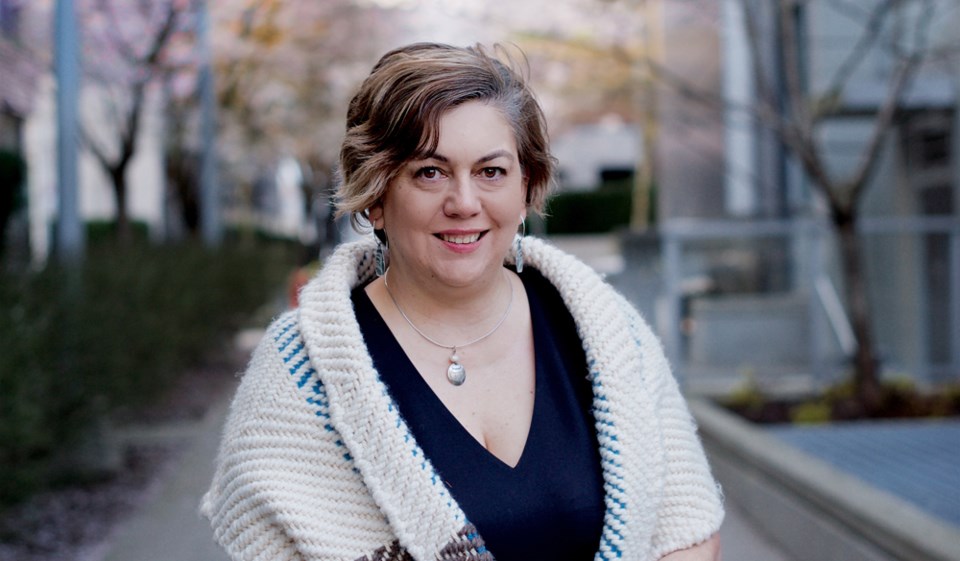Michelle Nahanee, communications consultant for the �鶹�����Nation, is a force to be reckoned with.
Her many career hats include roles as a strategic communicator, creative director and Indigenous “change maker.”
Nahanee, 49, recently completed her master of arts degree in communications at SFU, returning to school after 20 years as a graphic designer and consultant.
The Chief sat down for a chat with Nahanee to discuss her studies, her board game and her desire for change.
What follows is an edited version of that conversation.
��
Q: Your thesis at SFU was, “Decolonizing Identity: Indian girl to �鶹�����matriarch,” what do you mean by decolonizing identity?
A: In my thesis I talk about the different words that formed my identity. I am mapping out a trajectory of naming conventions and what those mean.
I was born �鶹�����and so for the first five years of my life in my community, this is who I was — Squamish.
Then as I entered school and found out I am “Indian.” I grew up in the 1970s and so Indian is actually a loaded word and changed how I saw myself. Then we became “Native” and there were Native organizations and then “Aboriginal,” and then “First Nations,” and then Indigenous. Now we are Skwxwu7mesh, in our language and the way we want to present ourselves.
I grew up in the community of Eslhá7an, but when I was growing up, it was called Mission Indian Reserve #1. That is a very different way of seeing yourself. Legally, it is still called Mission Indian Reserve, but we call it Eslhá7an, with the ‘7’ and it feels good to us. But what I am saying is that there is also a double face to it in that legally we are still carrying our status Indian cards. Many people still see us through a very racialized lens and haven’t been able to pull that apart.
��
Q: Can you tell me a bit more about the realization of some of the world seeing you differently than you saw yourself once you got to school?
A: You enter school and there’s an invisible segregation that happens. And then there’s the way I thought that we were — which was basically a tight knit family with lots of love and lots of fun and culture and then going to a place that doesn’t respect that. At that time, in the 70s, I think there was a lot of negative attitudes toward us and misunderstandings about who we were and what we had to offer.
��
Q: You created a life-sized board game, Sínulhkay and Ladders — which is reminiscent of Snakes and Ladders — and that you use with groups and organizations to help them with decolonization. The Sínulhkay, a double-headed sea serpent, represents exploitation that is dressed up as empowerment. The goal of the game, you’ve said, is to achieve “Chen chen stway,” meaning mutual support. How did you come to the ideas behind the game?
A: It was a way to talk about decolonizing practices in our work relationships — in our neo-colonial relations.
Through my career and observations of others, I have seen what I call “Sínulhkay,” or a double-faced action.
Situations that look like helping, but they are really not helping.
For example, I worked in the resource sector for a while as a communications person and we were always talking about how many jobs we had found for people. That was the positive spin of it, but the reality was they were entry-level jobs. They weren’t absolutely great jobs and then how were people treated on the job? I am trying to go deeper under the hype of inclusion.
In an era of reconciliation, it is not enough to bring in one consultant and talk about the time line, and that is your check mark and you are decolonized and you are reconciled. For example, one of the squares on my game is “Hire an Indigenous speaker for an event.” So, that is awesome, so you ladder up, but a few squares down is, “Fail to have the honorarium ready on the day of the event,” so you have to slide down.
The game is packed with scenarios like that.
��
Q: What is your overall sense of where we are going in terms of reconciliation?
A: I think we are moving along. I love the renaming of the two public squares in Vancouver [Vancouver Art Gallery north plaza as šxʷƛ̓ənəq Xwtl’e7énk Square, and the Queen Elizabeth Theatre Plaza as šxʷƛ̓exən Xwtl’a7shn], that is hugely symbolic. Definitely having people doing openings and acknowledgements is a huge improvement from the 1970s, but I am also saying we can’t just stop here. We need the real relationships. Don’t just think of us in terms of the past. Don’t just think of us in terms of only doing openings. Think of Indigenous intelligence as something that can be really helpful now, in your business settings, in your governance structures.
��
Q: You applied for a PhD and got two entrance scholarships, congratulations. What is next?
A: I want to continue to contribute to changing how people see us. My PhD project, which I will be starting in the fall back at SFU, is about �鶹�����matriarchy, women’s leadership — how does it work, what are the stories from our families that tell us who we are. I am so excited about it. And hopefully, someday I will be a professor.
��
Nahanee is offering two Decolonizing Practices workshops this summer using her board game. She is also working on a version of the game for the classroom. For more information go to




